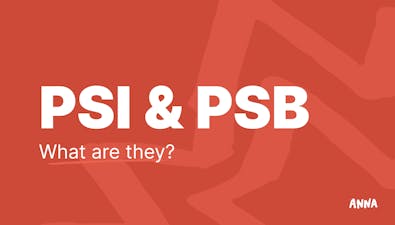
10 Tips To Choose a Perfect Business Name [2025 Guide]


Discover essential tips for choosing the perfect business name, including creative strategies, legal considerations, and branding advice for success.
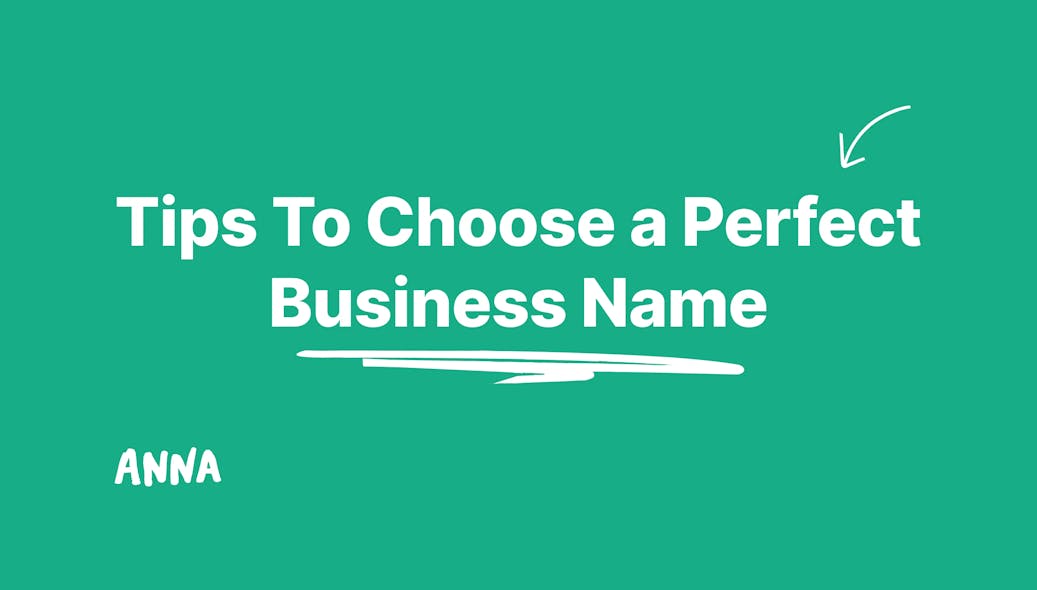
- In this article
- 1. Keep It Short, Sweet, and Memorable
- 2. Make Sure It’s Relevant (But Not Limiting)
- 3. Check for Existing Trademarks (Unless You Love Legal Drama)
- 4. Google It (Because the Internet Exists)
- 5. Make Sure It’s Easy to Spell and Pronounce
- 6. Get the Right Domain Name (Or As Close As Possible)
- 7. Be Unique (But Not Too Unique)
- 8. Check Social Media Handles
- 9. Avoid Trends and Buzzwords
- 10. Test It Out (Friends, Family, and Strangers Welcome)
- Final Thoughts
- How to Register a Company Name with ANNA
- FAQ
As a future business owner, you probably have a few names bouncing around in your head. Maybe you’ve got a favorite – or maybe you’re staring at a blank page, wondering if “Super Awesome Business” is a valid choice.
Either way, choosing a business name isn’t just about picking something that sounds cool.
You should craft an identity that reflects your brand, resonates with customers, and doesn’t land you in legal hot water. No pressure, right?
Don’t worry – we’ve got you covered. Here are 10 expert-backed and completely practical tips to help you choose the perfect business name.
1. Keep It Short, Sweet, and Memorable
Ever noticed how the most successful brands have short names? Nike. Apple. Qantas. They’re easy to remember and even easier to type.
If your name takes up an entire business card, it’s probably too long.
Aim for something that rolls off the tongue and sticks in people’s minds.
Studies have shown that customers recall shorter names more easily, making them more likely to refer your business to others.
Our perception of things is influenced by how easily we process them.
That same research found that stocks with simple, easy-to-pronounce names or symbols tended to perform better than those with more complex pronunciations, especially in the period following their initial public offerings.
However, the researchers emphasised that while name fluency plays a role, many other factors contribute to a company's valuation.
For example, a short and catchy name will also look great on a logo, website, and social media.
If people can’t remember or spell your name, they’re less likely to search for you online or recommend your business to a friend.
❌ Avoid:
- Overly complicated names like "The Exceptional Emporium of Handcrafted, Sustainable, Artisanal Delights, Pty Ltd."
- Names that require a PhD in linguistics to pronounce.
- Random strings of numbers or letters that mean nothing to anyone.
But there are still exceptions to the rule. Häagen-Dazs is an unlikely name for an American brand that most people learned to pronounce correctly.

2. Make Sure It’s Relevant (But Not Limiting)
Your business name should give customers an idea of what you do. However, don’t make it so specific that you box yourself in.
If you name your company “Sydney Cupcake Queens” and later expand to pies and pastries across the country, you might regret it.
Relevance is key because it helps customers immediately understand what your business is about.
But flexibility is also important – what if you decide to add more services or pivot entirely?
A business name that allows for growth can save you the hassle of a costly rebrand in the future.
✔️ Better approach:
- Pick something industry-relevant but flexible (e.g., "Sweet Haven" instead of "Cupcake Haven").
- Avoid location-based names unless you never plan to expand beyond that area.
- Think about your long-term business vision and how the name will fit if you diversify.
3. Check for Existing Trademarks (Unless You Love Legal Drama)
You come up with an amazing business name, print out marketing materials, and launch your website. A month later, you get a cease-and-desist letter from a company with the same name. Ouch.
To avoid this headache, conduct a thorough search before you get too attached to a name.
The last thing you want is to pour time and money into branding, only to find out you have to change your name.
📌 Extra tip:
- Use the Australian Business Name Register to check if your desired business name is available.
- Search the IP Australia trademark database to ensure it’s not already trademarked.
- Consult a trademark attorney if you’re unsure. A legal dispute can be expensive and stressful.
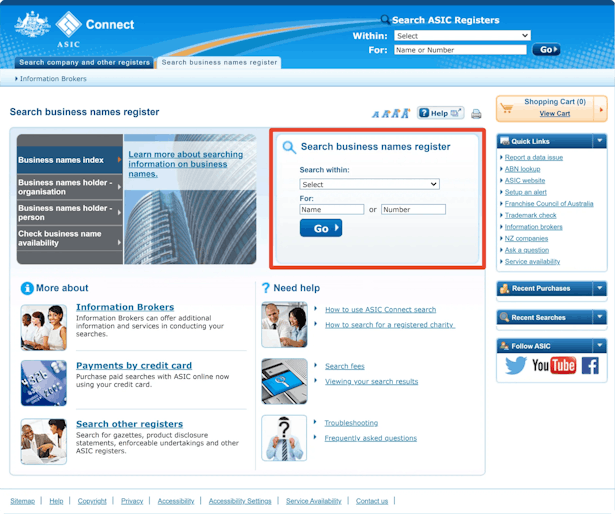
4. Google It (Because the Internet Exists)
Before you get too attached to a name, do a quick search.
If your dream name already belongs to a dodgy company or an obscure 90s rock band, you might want to reconsider.
A quick Google search will tell you a lot: does your name appear on multiple businesses?
Does it have an unexpected (or NSFW) meaning in another language?
These are all important things to know before finalising your decision.
You should also check customer reviews and news articles to make sure the name isn’t associated with negative press.
Business Name vs Company Name: Key Differences To Know
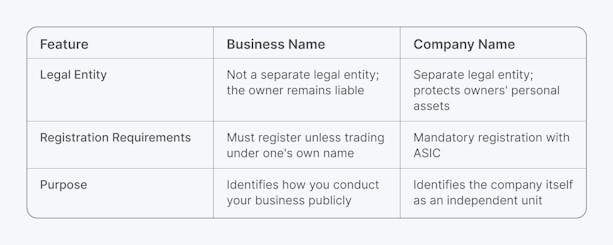
A business name is a name under which an entity operates and does not create a separate legal entity, meaning the owner remains personally liable for its actions.
In contrast, a company name refers to a registered company that is a distinct legal entity from its owners, providing them with personal asset protection and limited liability.
💡 To learn more about the topic, check out our What’s the Difference Between a Business Name and Company Name? guide.
5. Make Sure It’s Easy to Spell and Pronounce
Imagine trying to explain your business name over the phone:
"It’s ‘Xzæfyl & Co.’—that’s X-Z-A-E-F-Y-L. No, not ‘fail.’ F-Y-L. Hello? You still there?"
If your name isn’t easy to spell or pronounce, potential customers might not remember it – or worse, they might spell it incorrectly when trying to find you online.
A name that’s difficult to pronounce can also create issues when networking or giving referrals.
Keep it simple, intuitive, and phonetically clear.
6. Get the Right Domain Name (Or As Close As Possible)
You already know that your website is your digital storefront, so your business name should be domain-friendly.
Ideally, you’ll get a .com.au version of your name.
If that’s taken, consider adding a relevant keyword (e.g., "Get[YourBusinessName].com.au").
Having a matching domain makes it easier for customers to find you online and adds credibility to your brand.
If you can’t secure the exact domain, consider alternatives but avoid complicated workarounds.
❌ Avoid:
- Domains with weird spellings or unnecessary hyphens (e.g., "Best-Cars-4-U.biz").
- Names that autocorrect into something embarrassing.
📌 Key Trends in Australian Domain Names for 2025
1️⃣ Surge in .au Direct Domains: The adoption of .au direct domains is growing as Australians embrace shorter, more memorable website addresses. This shift provides a streamlined alternative to .com.au, making it easier for individuals and businesses to secure a unique digital identity.
2️⃣ Rise of New Generic TLDs (ngTLDs): While not exclusive to Australia, businesses are increasingly exploring industry-specific and creative domain extensions beyond traditional options. This global trend is influencing Australian companies looking for unique branding opportunities.
3️⃣ Stronger Focus on Local Branding: Country-code TLDs (ccTLDs) like .au remain essential for businesses wanting to establish a distinctly Australian online presence. Consumers often trust local domain names, reinforcing their importance in brand strategy.
4️⃣ Shift Towards Independent Platforms: More brands and content creators are moving away from social media dependency and investing in their own dedicated domains. Owning a domain provides greater control over branding, audience engagement, and long-term digital presence.
7. Be Unique (But Not Too Unique)
While it’s great to stand out, don’t go full "Xerox" or "Google" unless you have a billion-dollar marketing budget to make up for the confusion. A unique name is important, but it should still be relatable and easy to understand.
✔️ A balance:
- Unique but understandable: "Zesty Bites Catering"
- Too unique and confusing: "Zxqbr Food Innovations"
Being distinctive helps with brand recognition, but an overly complicated or bizarre name can alienate potential customers.
8. Check Social Media Handles
Imagine securing your business name only to find out someone on Instagram is already using it for their pet turtle’s fan page.
Social media is essential for modern businesses, so ensure your business name is available across major platforms like Instagram, TikTok, Facebook, LinkedIn, and X (Twitter). Use an online social media handle checker to check that your chosen business name is available on all the top social media platforms. Creative social media teams in Dubai can also help you craft a cohesive presence and optimize your brand across these channels
If your preferred handle is taken, consider small tweaks like adding "AU" to the name.
However, avoid long or overly modified usernames that are hard to remember.
9. Avoid Trends and Buzzwords
What sounds trendy today might be cringe-worthy tomorrow (looking at you, "Yeet Enterprises"). Pick a timeless name that won’t feel outdated in a few years. Business names that rely on current fads can quickly lose relevance and make it harder to rebrand when trends fade.
❌ Avoid:
- Slang that won’t age well.
- Names based on current fads (e.g., "Crypto Everything" when the hype dies down).
- A strong business name should have longevity and not be tied to a short-lived cultural reference.
10. Test It Out (Friends, Family, and Strangers Welcome)
Say your potential name out loud. Ask friends and family for feedback. If people look confused, mispronounce it, or laugh for the wrong reasons, reconsider.
You can also test it on potential customers by running a small poll.
✔️ Good test questions:
- Can people spell it without asking?
- Does it evoke the right emotions?
- Would a 10-year-old and a 70-year-old understand it?
Final Thoughts
Choosing a business name is part art, part strategy, and part "trying not to lose your mind." The right name will capture your brand’s essence, be easy to remember, and help you stand out in your industry.
Follow these tips, test your options, and when in doubt, keep it simple, unique, and memorable. Now go forth and name your business like a pro!
How to Register a Company Name with ANNA
Registering your company name with ANNA is simple, fast, and comes with a range of benefits to help you get started smoothly. Follow these steps:
📝 Step 1: Choose a Unique Name
Use ANNA’s search tool to check if your preferred company name is available.
Ensure the name is unique and reflects your brand’s identity.

🏠 Step 2: Provide a Registered Office Address
Enter an Australian address where official communications (like ASIC letters) will be sent.
This must be a real, physical location in Australia.
👤 Step 3: Enter Director and Shareholder Details
Provide the name, date of birth, place of birth, and residential address of the company’s director and shareholder(s).
💳 Step 4: Set Up Your Business Account
Once your company is registered, open an ANNA business account to manage bookkeeping, invoicing, GST, and company taxes—all in one place.
📌 Coming Soon: Business Name Registration
Soon, you’ll be able to register your business name effortlessly with ANNA’s ABN registration service.
Whether you need a trading name different from your company’s registered name or you're launching a new venture, this feature will simplify the process.
For extra peace of mind, consider consulting a legal expert to ensure your business name aligns with your long-term goals.
Why Choose ANNA for Business Finance Management?
✔️ Hassle-Free Company Registration – No complicated paperwork.
✔️ Smart Document Storage – Effortlessly manage receipts and invoices.
✔️ Automated Tax Calculations – Stay on top of your tax obligations.
✔️ Personalised Tax Calendar – Never miss an important deadline.
✔️ Real-Time Financial Insights – Make informed decisions with up-to-date data.
✔️ Expert Accountant Support – Get tailored guidance when you need it.
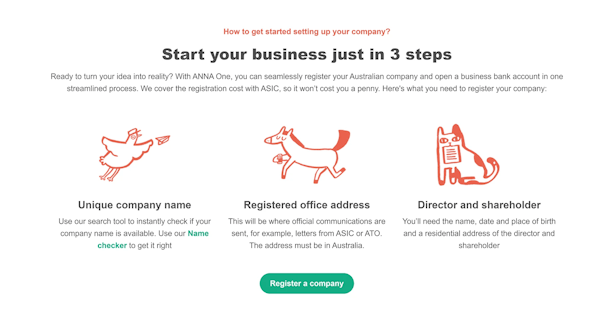
Ditch the paperwork and simplify your business finances with ANNA. Sign up today and take control of your business with smart financial management.
FAQ
1. Do I Need To Register My Business Name?
Yes, if you want to trade under a specific name that is not your personal name, you must register it with ASIC.
2. How Do I Choose A Good Business Name?
Choose a name that is memorable, easy to pronounce and spell, original, and not similar to existing trademarks or company names.
3. Can I Use My Personal Name As My Business Name?
Yes, but only if it's exactly your personal name (e.g., Jane Smith). If you add other words (e.g., Jane Smith & Co), you need to register the new name.
4. What Happens After Registering My Business Name?
You will need to renew your registration periodically (every 1 or 3 years) with ASIC.


